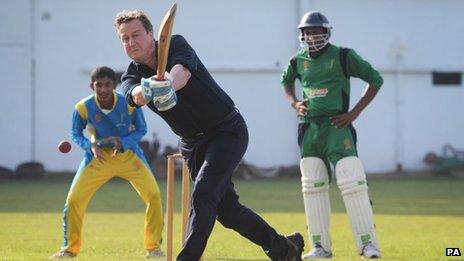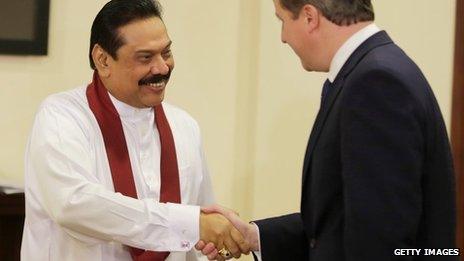David Cameron: A lonely wicket
- Published
- comments

David Cameron is in Sri Lanka for the Commonwealth Heads of Government Meeting
No-one on the planet has taken more Test wickets than Muttiah Muralitharan but not even he gets to bowl every day to a prime minister.
Today at the Colombo cricket club the world's greatest spinner made it easy for David Cameron when he was holding a cricket bat but much much harder afterwards on the political pitch.
The two men met in the Sri Lankan capital not simply because Mr Cameron wanted to meet a world famous cricketer but because he also wanted to meet the world's most famous Tamil - the minority in a country that's alleged to routinely abuse their human rights in the north of the island.
Muralitharan has set up a foundation which uses cricket to try to bring about reconciliation.
After stressing that he was "a sportsman and we don't think about politics" he said that the prime minister "must have been misled...people speak without going and seeing the things there".
"I go on and off. I see from my eyes there is improvement.
"My opinion is, there were problems in the last 30 years in those areas. Nobody could move there.
"In wartime I went with the UN, I saw the place, how it was. Now I regularly go and I see the place and it is about a 1,000% improvement in facilities."
He even praised the much hated Sri Lankan army for helping him build cricket facilities in the north. Perhaps revealing the sentiment of someone not from the war-torn part of this island, he added.
"This country is 20-odd million people. In the north there are only one million people. They are getting more attention than the south at the moment."

Mr Cameron said he would push the UN for a resolution in March
'Too soon' for progress
This came on the morning after Mr Cameron's night before and what was clearly a tense and difficult meeting between the prime minister and Sri Lanka's President Rajapaksa.
The PM called it "frank and clear" but denied that that was diplomatic language for a dialogue of the deaf.
Nevertheless, the Sri Lankan leader has done nothing to suggest that he is listening to the criticisms he has heard, insisting that four years after the end of a civil war that lasted a quarter of a century is too soon to expect more progress.
Having failed to persuade the president of the need to set up an independent inquiry into allegations of war crimes - after the death of an estimated 40,000 civilians - the Mr Cameron now says he will push the United Nations to do so at the next meeting of its human rights council in March.
It is clear that if President Rajapaksa is to relax his hard-line stance, it will have to be international not domestic pressure that persuades him.
However, Mr Cameron is short of allies at this summit. The new Australian Prime Minister Tony Abbott declared at the outset that "we are here to praise as much as judge".
Mr Cameron has found it rather lonely batting on this Sri Lankan wicket.
16:12 GMT update:
A British Tamil has written to make the point - hinted at in my blog - that Murali does not represent the Tamils of northern Sri Lanka
"Whilst I take your point that Mr Muralitharan is one of the most famous Tamils in the world (amongst the 4 Nobel Prize Winners, world chess grandmaster and the famous Oscar-winning composer, AR Rahman, and even the UN human rights chief Navi Pillay), he is certainly not representative of all the Tamil community.
"The Tamils in the north of Sri Lanka are completely different to those that are from the hill counties such as Kandy from where Mr Muralitharan originates.
"These Tamils were brought by the British during colonial times to work on and manage the tea plantations in these areas.
"The Tamils in the northern territories, however, such as Jaffna, Vanni, Batticoloa and Trincomelee, were those that settled more than 2000 years ago as well as later on from the Chola Empire incursions from southern India during the 1st millennium.
"Politics in the country reflects this origin where the hill country Tamils are more close to the Sinhalese."